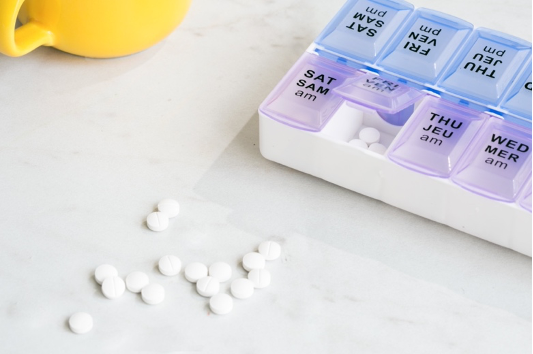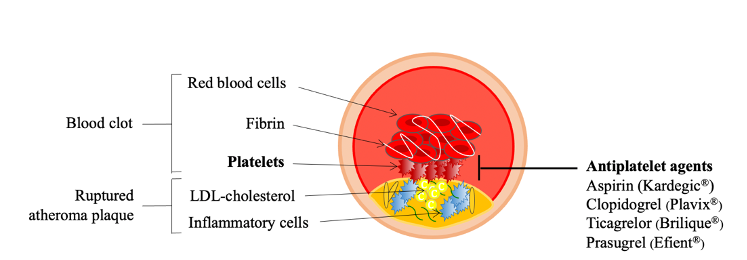How to make sense in all of the preventive medications ?
Following a cardiovascular event that required the implantation of stent(s) in one or many coronary arteries, the interventional cardiologist will prescribe you a panel of medications that you will need to take rigorously. It is important to know your treatment, the role of each drug, how and when to take them and what to do in case of side effects.

Antiplatelet agents
Antiplatelet agents are cornerstone in the treatment of a myocardial infarction, in patients with stable coronary artery disease and in those undergoing a coronary angioplasty. Drugs include aspirin (Kardegic®) and the following antithrombotic agents: clopidogrel (Plavix®), ticagrelor (Brilique®) and prasugrel (Efient®).
How does it work?
Acute myocardial infarction is caused by a blood clot in the coronary artery, which blocks the normal blood flow in the heart muscle. The role of antiplatelet agents is to decrease the ability of blood clots to form by preventing platelet aggregation. These drugs prevent the recurrence of blood clot formation in the coronary arteries as well as stent blockage, thus ensuring proper healing within the artery.
How and when should you take it?
Dosage, frequency of administration and duration of the drug therapy should be well known by the patient and followed judiciously. The treatment will be reassessed during follow-up with your treating cardiologist. Dual antiplatelet therapy is usually administered for 6 – 12 months, while aspirin is taken for a longer period.
In case you need to undergo dental or surgical intervention requiring temporary discontinuation of treatment, it is essential to consult your attending physician / cardiologist beforehand.
Are there any side effects?
Since antiplatelet agents inhibit blood coagulation, they can cause bruising on the skin, as well as nose or gum bleeding. In addition, wounds tend to bleed more, requiring extra care when handling sharp objects or playing sports.
The occurrence of profuse bleeding, blood in the urine or in the stools should be promptly reported to the attending physician or cardiologist. It is important to never interrupt your treatment without prior medical advice.

Trinitrate/ natispray®
How does it work?
The role of trinitrate is to dilate the narrowed coronary artery in order to increase blood flow and thus suppress symptoms of angina pectoris. Since the drug affects all the arteries in the body, it transiently lowers blood pressure, which requires you to be seated when taking the medication.
How and when should you take it?
When chest pain occurs, it is advisable to take a dose sublingually while sitting, then repeat the dose at 5 minutes intervals. If the pain persists after 15 minutes (3 doses maximum), dial 15 – emergency services.
Are there any side effects?
Nitrates may cause fatigue and headaches.
Betablockers
How do they work?
Betablockers are drugs that decreases the heart rate in order to maximize blood flow delivered to the heart muscle and thus, decreases the occurrence of angina symptoms.
How and when should you take it?
Betablockers are taken daily, however the dose and frequency of administration varies among different types of drugs. To note that it is crucial to avoid stopping abruptly the treatment since it could trigger the recurrence of angina symptoms.
Are there any side effects?
Fatigue, lightheadedness, and bradycardia (slow heartbeat) are among the side effects that can occur with betablockers. In addition, some men may experience sexual impotence. If such symptoms occur, it is important not to stop the treatment on your own but rather to consult your treating physician or cardiologist who will re-evaluate your treatment appropriately.
Lipid-lowering agents – statins
How do they work?
The role of statins is to lower the level of bad LDL-cholesterol in the blood. Several international studies have demonstrated the benefits of statins on the risk of recurrence of coronary events.
How and when should you take it?
Statins are taken on a daily basis and the dosage varies depending on the underlying condition and LDL-cholesterol level. Treatment is re-evaluated during follow-up with your attending cardiologist.
Are there any side effects?
Statins can cause mild, moderate, and severe muscle pain. If these symptoms occur, it is important to consult your treating cardiologist who can reassess the possibility of reducing or substituting the drug for another treatment.